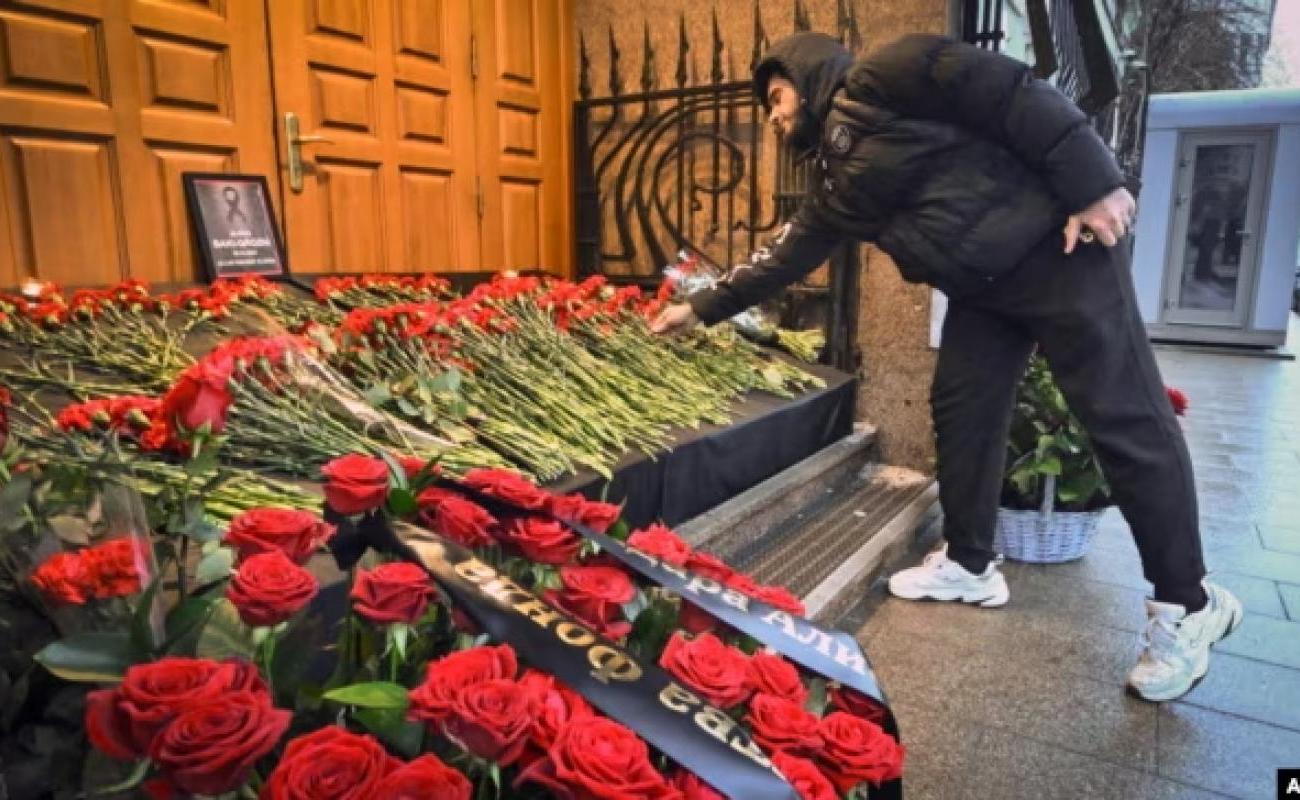After A Plane Crash, Putin's Partial Apology Speaks Volumes

When Russian President Vladimir Putin apologized to his Azerbaijani counterpart over the crash of a passenger jet that was damaged in the sky above Chechnya, it was an extremely rare if not unprecedented occurrence in his 25 years in power.
It was also incomplete: Putin apologized for "the fact that the tragic incident occurred in Russian airspace,” the Kremlin said in a readout of a phone call with Azerbaijani President Ilham Aliyev on December 28 -- three days after the Embraer-190 crashed in Kazakhstan, across the Caspian Sea from Chechnya, killing 38 of the 67 people on board.
Putin did not accept Russia’s responsibility for the crash and stopped short of stating what multiple pieces of evidence suggest: that a Russian missile fired amid what Moscow said was a Ukrainian drone attack on Grozny may have led to the disaster.
The rare apology and its limited nature point to a struggle by the Kremlin to avoid major damage to relations with Azerbaijan, Kazakhstan, and other countries in the region while at the same time refusing to say Russia was responsible.
“On one hand, this is perhaps the first time Putin has apologized to a foreign state for Russia’s actions in real time, not for some historical guilt of previous authorities -- a watershed moment in Russian foreign policy,” Alexander Baunov, a senior fellow at the Carnegie Russia Eurasia Center in Berlin, wrote in a thread on X, formerly Twitter.
“On the other hand, the wording avoids direct acknowledgment of responsibility. What we see is recognition of the incident without admission of guilt, which seems to have left Baku and its allies dissatisfied,” Baunov wrote. “For Azerbaijan, the lack of accountability in the Kremlin’s statement remains a sticking point.”
Whatever he and Putin said in private, Aliyev’s public comments were pointed. In an interview aired on December 29, he said the plane’s tail section was severely damaged “by fire from the ground,” accused Russia of trying to “cover up” the cause, and suggested the apology should have come sooner. He made no mention of the conversation with Putin.
Aliyev said that attributing the crash to a bird strike or the explosion of a gas canister on board, versions put forward by Russian media and officials, was “both stupid and dishonest.” He alluded to speculation that Russian authorities may have redirected the damaged jet to Aqtau, Kazakhstan, in the hope that it would crash into the Caspian, hiding evidence of an external blast.
Declining Regional Clout
He also said Azerbaijan had “categorically” rejected Russia’s proposal that the Moscow-based Interstate Aviation Committee investigate the crash. “The reason is clear: because it is no secret that this organization consists mostly of Russian officials and is headed by Russian citizens. The factors of objectivity could not be fully ensured here.”
From Putin’s partial, belated, apology to the tone and content of Aliyev’s remarks, the back-and-forth seems to underscore Russia’s declining regional clout.
“Inside Russia’s ‘near abroad’ -- the states on territory formerly part of/occupied by the U.S.S.R., which Russia has thought of as its sphere of interest since 1992 --– things are not looking good” for Moscow, Ruth Deyermond, senior lecturer in the Department of War Studies at King's College London, wrote in an end-of-year thread on the social media site Bluesky.
“A telling-off from the president of Azerbaijan would be bad enough in itself, but the tragedy has also drawn international attention to the embarrassing reason for the incident -- Russia having to defend itself from Ukrainian drones over Chechnya,” Deyermond wrote.
Putin’s focus on the war against Ukraine -- his effort to subjugate the country by force -- is one of the factors that has dented Moscow’s influence in the South Caucasus and in Central Asia. Russia’s neighbors are not enthusiastic about the war, but it has handed some of them levers over Moscow.
“Azerbaijan is a crucial partner in ‘laundering’ Russian gas -- buying north of £30 million ($38 million) worth a month to re-export it to Europe as its own. It is also allied to Turkey, whom Putin hopes will help him keep his bases in Syria,” London-based analyst Mark Galeotti wrote in The Times on December 28. “Kazakhstan, likewise, is one of the countries most heavily engaged in importing goods covered by sanctions then quietly re-exporting them to Russia.”
The air disaster came weeks after the ouster of Syrian President Bashar al-Assad, which has diminished Russia’s reputation as a powerful player abroad and threatens to shrink its footprint in the Middle East.
In addition to harming Russia’s image in the region and beyond, the plane crash and its aftermath have exposed a vulnerability that the Kremlin works hard to hide, Galeotti suggested.
“Vladimir Putin notoriously never apologizes. Yet following the accidental shooting down of an Azerbaijani Airlines passenger plane on Christmas Day, he has come as close as he ever could. He stopped short of admitting that it was a Russian missile that was to blame, but recognized…that ‘the tragic incident occurred in Russian airspace,” he wrote. “His unusual candor reflects the way Putin’s position, while strong, is brittle, and can be threatened by unexpected crises.”
